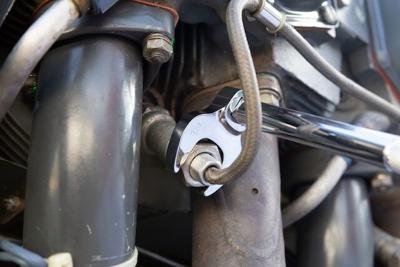
Hydraulic cylinders may not be a topic that crops up in ordinary conversations. Still, they perform a crucial function in many industries, discreetly powering machines and equipment that make our lives simpler. Whether it's a construction site, a factory, or even the refuse vehicle that collects your detritus, chances are there's a hydraulic cylinder functioning behind the scenes. Whether you're inquisitive about these mechanical marvels or have a hydraulic system in your business, comprehending the optimal time for repairing hydraulic cylinder is valuable. In this article, we'll delve into the world of hydraulic cylinders, investigate signs of wear and damage, and advise you on when to opt for repair or replacement.
Hydraulic Cylinders and Their Importance in Various Industries
Hydraulic cylinders are mechanical devices that use fluid power to conduct labor. They consist of a cylindrical barrel, a piston, and hydraulic fluid. When poured into the cylinder, the hydraulic fluid propels the piston, creating a linear motion that can be used for various purposes. Hydraulic cylinders are found in various industries, from construction and agriculture to manufacturing and automotive. In construction, they're used in excavators to elevate massive loads and in bulldozers to transfer soil. In agriculture, they propel the appendages of tractors and other apparatus. In manufacturing, hydraulic cylinders are essential for bending, pressing, and stamping operations. Even your car may have hydraulic cylinders in its braking system.
Signs of Hydraulic Cylinder Wear and Damage
Like any other mechanical component, hydraulic cylinders can experience wear and degradation over time. Recognizing the signs of wear and damage is crucial to determine whether repair or replacement is the correct action. Some of them include:
Leaking Hydraulic Fluid
One of the most evident symptoms of the problem is a discharge in the hydraulic cylinder. Suppose you observe droplets of hydraulic fluid around the cylinder or on the ground. In that case, it's a distinct indication that something is awry.
Slow or Uneven Movement
Hydraulic cylinders are designed to provide seamless and consistent motion. If you observe that the cylinder is moving slower than usual or the movement is irregular, it could be due to internal damage or a worn-out seal.
Reduced Lifting Capacity
Over time, hydraulic cylinders may lose their ability to elevate tremendous masses. Suppose the cylinder struggles to elevate the same weight it used to handle effortlessly. In that case, it's a sign of attrition and reduced efficacy.
Strange Noises
Unusual noises during operation, such as grinding, squealing, or pounding, should not be disregarded. These sounds often indicate friction, misalignment, or damage within the cylinder.
Excessive Heat
If the hydraulic cylinder becomes excessively inflamed during operation, it could indicate internal problems. Overheating can lead to further injury and should be addressed promptly.
When to Opt for Hydraulic Cylinder Repair
Now that you can identify signs of wear and damage let's discuss when it's best to opt for hydraulic cylinder repair.
Minor Leaks
If you observe a minor hydraulic fluid escape, particularly from a seal or gasket, repairing it may be the most cost-effective solution. Prompt seal replacement can prevent further damage and restore the cylinder's efficacy.
Seal and O-Ring Replacement
Hydraulic cylinders rely on seals and O-rings to prevent fluid leakage and maintain pressure. If these components show signs of wear or damage, replacing them can often restore the cylinder's functionality.
Cylinder Rod Resurfacing
If the cylinder rod (the part that extends and retracts) is mildly damaged or deteriorated, it can be resurfaced through restoration techniques like honing or chrome plating.
Minor Internal Damage
Some internal components of hydraulic cylinders, such as bearings or bushings, can wear out or become damaged. In many cases, these elements can be replaced without replacing the entire cylinder.
Cost Consideration
Repairing a hydraulic cylinder is usually more cost-effective than replacing it, particularly for minor issues. It helps extend the life of the cylinder without a substantial financial outlay.
When to Consider Hydraulic Cylinder Replacement
While repairs can address many problems, there are situations where replacing the hydraulic cylinder is the wiser choice; some include:
Severe Damage
If the cylinder has sustained extensive damage, such as a distorted or fractured barrel, it may be beyond repair. In such instances, replacing the entire cylinder is necessary for safety and efficacy.
Old Age
The life of a hydraulic cylinder is limited. Consider a cylinder that is often maintained and approaching the end of its projected service life. The cost-effectiveness of purchasing a new one with a warranty may be greater.
Safety Issues
It's critical to err on caution and replace the cylinder rather than attempting restorations if a cylinder failure could provide safety risks to operators or the environment.
Conclusion
Knowing when to replace versus repair hydraulic cylinders is crucial for maintaining efficiency, safety, and cost-effectiveness. Regular maintenance and inspection can aid in early problem identification, enabling prompt restorations and preventing more significant damage. When confronted with a defective hydraulic cylinder, comprehensively evaluate the scope of the issue, take financial considerations into account, and place safety first.


(0) comments
We welcome your comments
Log In
Post a comment as Guest
Keep it Clean. Please avoid obscene, vulgar, lewd, racist or sexually-oriented language.
PLEASE TURN OFF YOUR CAPS LOCK.
Don't Threaten. Threats of harming another person will not be tolerated.
Be Truthful. Don't knowingly lie about anyone or anything.
Be Nice. No racism, sexism or any sort of -ism that is degrading to another person.
Be Proactive. Use the 'Report' link on each comment to let us know of abusive posts.
Share with Us. We'd love to hear eyewitness accounts, the history behind an article.